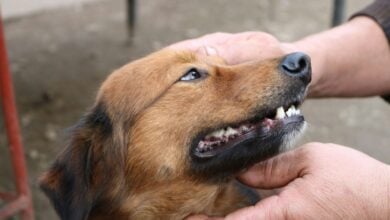Why Is My Dog Throwing Up Undigested Food? I Thought It Wasn’t A Problem; Then It Got Worse
When you purchase through links on our site, we may earn a commission. Here’s how it works.
I thought my dog, Tiny, was a rare case. He’d eat breakfast like usual, but minutes later, I’d walk into the kitchen to find his entire meal, barely digested, on the floor near his food bowl. Tiny would look up at me, wagging his tail and still hungry.
Table of Contents
Was he sick? Was the food bad? I had no idea. At first, it only happened a couple of times a month, and he seemed fine afterward. Then, it became a routine every few days.
After some digging, I realized I wasn’t alone. Many dog owners are dealing with the same messy mystery: Why is my dog throwing up undigested food right after eating? I also discovered that it can happen for a wide variety of reasons.
It’s Time To Be A CSI: Vomiting Or Regurgitation?
With many dog-related health issues, self-education and investigation are key as a pup owner. You must home in on your inner crime scene investigator for your furry friend. But here’s where I can help!
Before you can figure out why your dog is throwing up undigested food, it helps to understand what’s actually happening. Inspecting dog puke isn’t anyone’s idea of fun, but knowing the difference between regurgitation and vomiting is the first step toward solving the mystery.
Vomiting and regurgitation happen in totally different ways, so your dog’s behavior can also offer some clues. Knowing which one you’re dealing with may help you narrow down the cause and fix the problem faster. But sometimes, you need your vet’s help.
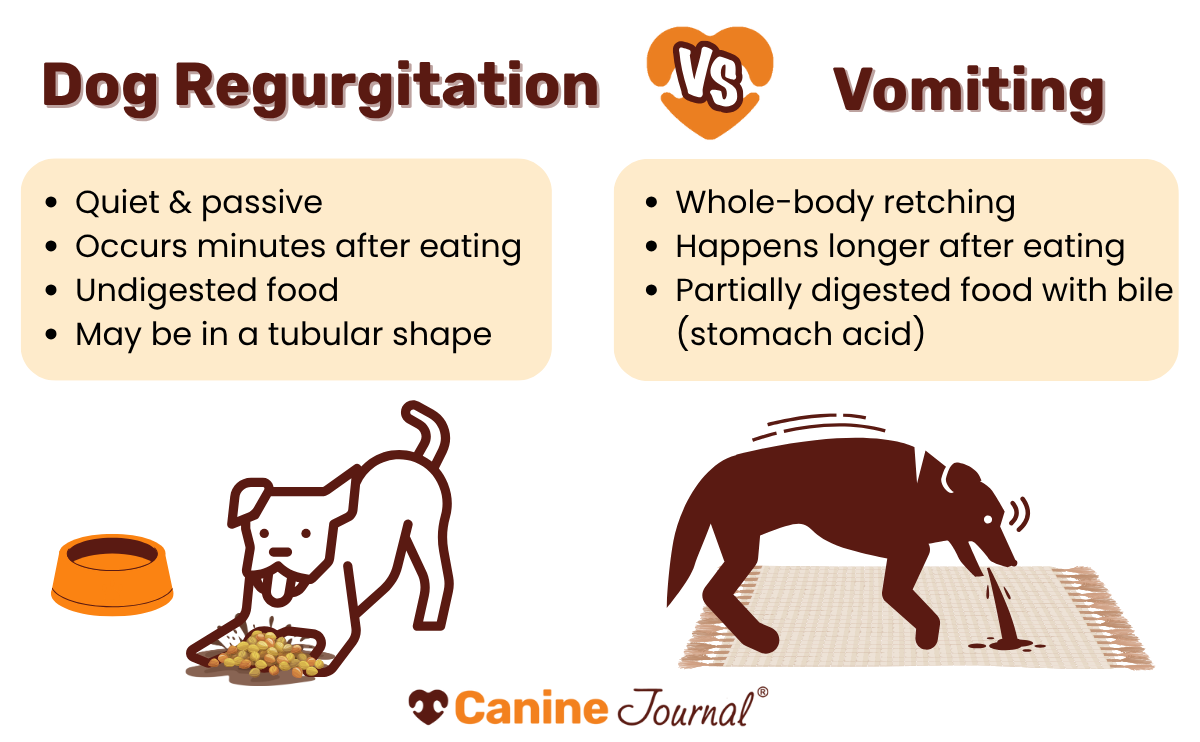
Regurgitation: A Quick Food Rebound
Regurgitation happens when food comes back up from the throat or esophagus, not the stomach or intestines. It’s usually quick and doesn’t involve heaving or nausea.
Typical signs of regurgitation:
- Happens within minutes after eating
- Quiet — no retching, heaving, or drooling beforehand
- Comes out easily, often in a tubular or sausage shape
- Food looks nearly untouched and may be coated in mucus
- Your dog acts totally normal afterward
Simply put, the food never made it to the stomach. Regurgitation is a calm, almost effortless return of what your dog just ate. There’s no warning, no heaving, no bile. It can look like vomiting, but it’s really more of a rewind than a full-blown sick episode.
Vomiting: The Noisy, Gut-Wrenching Kind of Sick
Vomiting is more dramatic and forceful. It’s a full-body effort, usually triggered by irritation in the stomach or intestines.
How to spot vomiting:
- Happens any time — right after eating or hours later
- Often starts with lip licking, pacing, or drooling
- Involves strong abdominal contractions and retching sounds
- Food is partially digested and may include bile (yellow or green)
- Your dog might seem nauseous or tired afterward
If your dog is gagging, heaving, or clearly straining, it’s likely vomiting, not regurgitation. This kind of throwing up usually points to an upset stomach, illness, or a more serious underlying issue.
Vomit color sometimes matters, too. Yellow or green often means bile and may point to issues like gastritis. Red or black could be signs of something more serious. See our dog vomit color guide to learn more.
If your dog vomits regularly, it’s time for your vet to investigate.
Red Flag! When Throwing Up Undigested Food Is A Life-Threatening Emergency
Large, deep-chested dogs are prone to gastric dilatation-volvulus (GDV), also called canine bloat. It occurs when a dog’s stomach fills with gas, food, or fluid and then twists on itself, cutting off blood supply to the stomach and other vital organs.
GDV can cause a dog to regurgitate food because the stomach gets cut off from the esophagus when it twists. This condition is a medical emergency requiring immediate veterinary attention. Breeds at a high risk for GVD include:
- Great Danes
- Standard Poodles
- Irish Setters
- Irish Wolfhounds
- Akitas
- German Shepherds
- Weimaraners
- Saint Bernards
- Boxers
7 Reasons Dogs Regurgitate Undigested Food
If your dog is regurgitating — bringing up food effortlessly and soon after eating — there are several common culprits. Some are manageable, and in many cases, a simple adjustment to routine can help.
However, sometimes, your pup has an underlying health issue or anatomical problem.
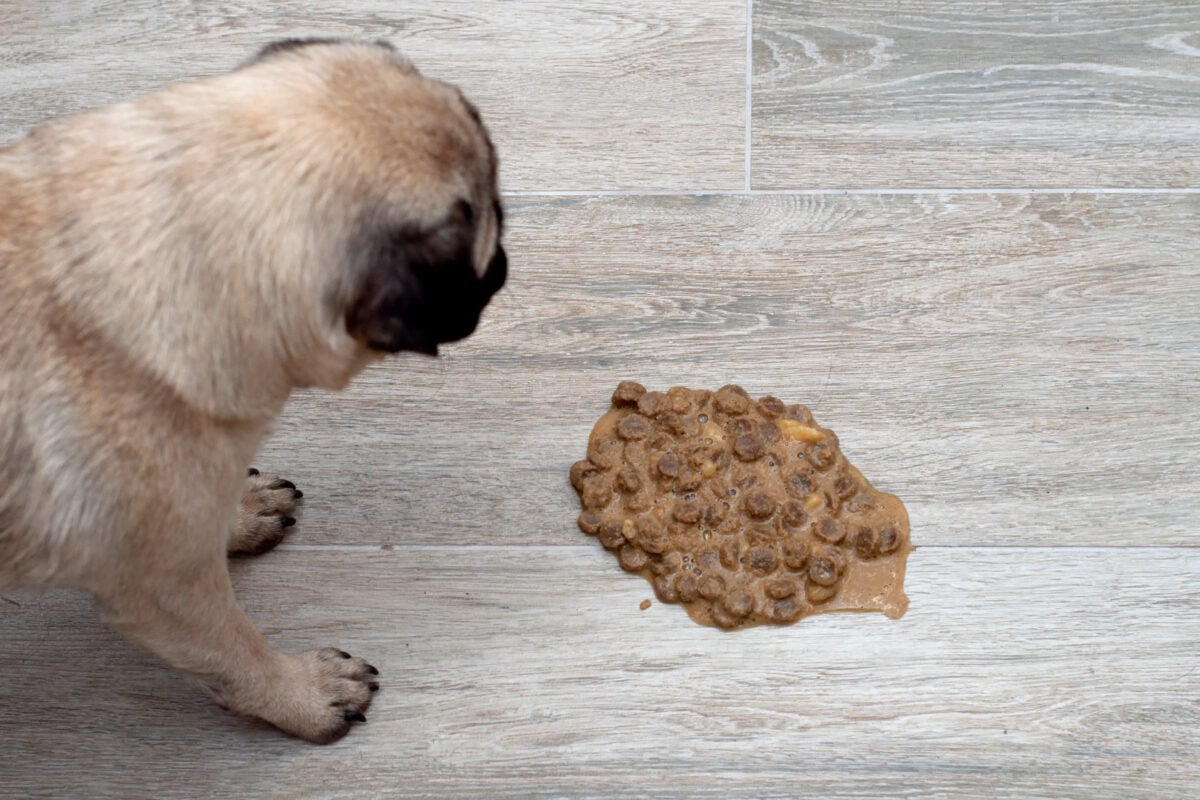
1. The Speed-Eater Syndrome
If your dog eats like they’re in a race, they might swallow air too quickly. That air creates pressure in the esophagus, making food bounce back up.
Why it happens:
- Naturally high food drive (hello, Labrador Retrievers)
- Competition with other pets during mealtime
- Skipping meals may lead to overeating later
What helps:
- Use a slow feeder bowl or snuffle mat
- Feed smaller meals 3-4 times a day
- Separate pets during feeding to reduce the drive for food competition
Sometimes, just slowing things down is enough to stop the regurgitation altogether.
2. Chugging Water Before or After Meals
Some dogs chug water like they’re doing a beer bong at a frat party. Drinking too much, too fast, especially around mealtime, can flood the stomach and cause regurgitation.
What you can do:
- Offer smaller amounts of water more frequently
- Try a dog water fountain to encourage slower sipping
- Place water bowls in calm, quiet spots
- Avoid feeding right after exercise or play sessions (it might trigger excessive drinking)
3. Stressed-Out at Mealtime
Dogs are sensitive to their environment. If your pup feels rushed, threatened, or overstimulated during meals, they may regurgitate from anxiety alone.
Watch for signs like:
- Guarding the food bowl
- Refusing to eat unless alone
- Pacing or whining before or after meals
To help your dog feel safer at mealtime:
- Feed in a quiet space away from noise and other pets
- Stick to a predictable routine
- Try calming aids like playing classical music or a calming supplement
4. Did They Swallow Something They Shouldn’t Have?
Dogs explore the world with their mouths and sometimes swallow things they shouldn’t. If something gets stuck in the esophagus, it can block food from reaching the stomach.
Red flags include:
- Sudden onset of regurgitation
- Drooling or pawing at the mouth
- Signs of pain or panic after eating
This is a medical emergency. If you suspect your dog swallowed something that’s now stuck, get to the vet immediately.
5. Esophagitis
Inflammation in the esophagus can prevent food from moving smoothly into the stomach. This could be caused by previous vomiting episodes, acid reflux, or even medication side effects.
Clues this may be the issue:
- Frequent regurgitation with no other apparent cause
- Avoiding food or eating slowly
- Gagging, coughing, or discomfort while swallowing
Your vet may recommend dietary changes or medication to reduce inflammation and heal the esophagus.
6. Esophageal Conditions
Some dogs are born with or develop anatomical issues like megaesophagus, which causes the esophagus to become enlarged and unable to move food properly.
Other possible conditions:
- Vascular ring anomaly (blood vessels squeezing the esophagus)
- Esophageal strictures (narrowing from scarring or birth defects)
- Esophageal dysmotility disorder (the esophagus doesn’t contract properly)
- Cricopharyngeal achalasia (failure of the upper esophageal sphincter to relax during swallowing)
Treatment may include:
- Feeding in an upright position (Bailey chair feeding)
- Specialized diets with soft or blended foods
- Medications to manage symptoms
- Surgical intervention in severe cases
Many of these conditions are lifelong but manageable with the proper care. According to the Merck Veterinary Manual, breeds at a higher risk of megaesophagus and other esophageal abnormalities include:
- Fox Terriers
- Miniature Schnauzers
- Great Danes
- German Shepherds
- Labrador Retrievers
- Shar Peis
- Newfoundlands
- Goldendoodles
- Dachshunds
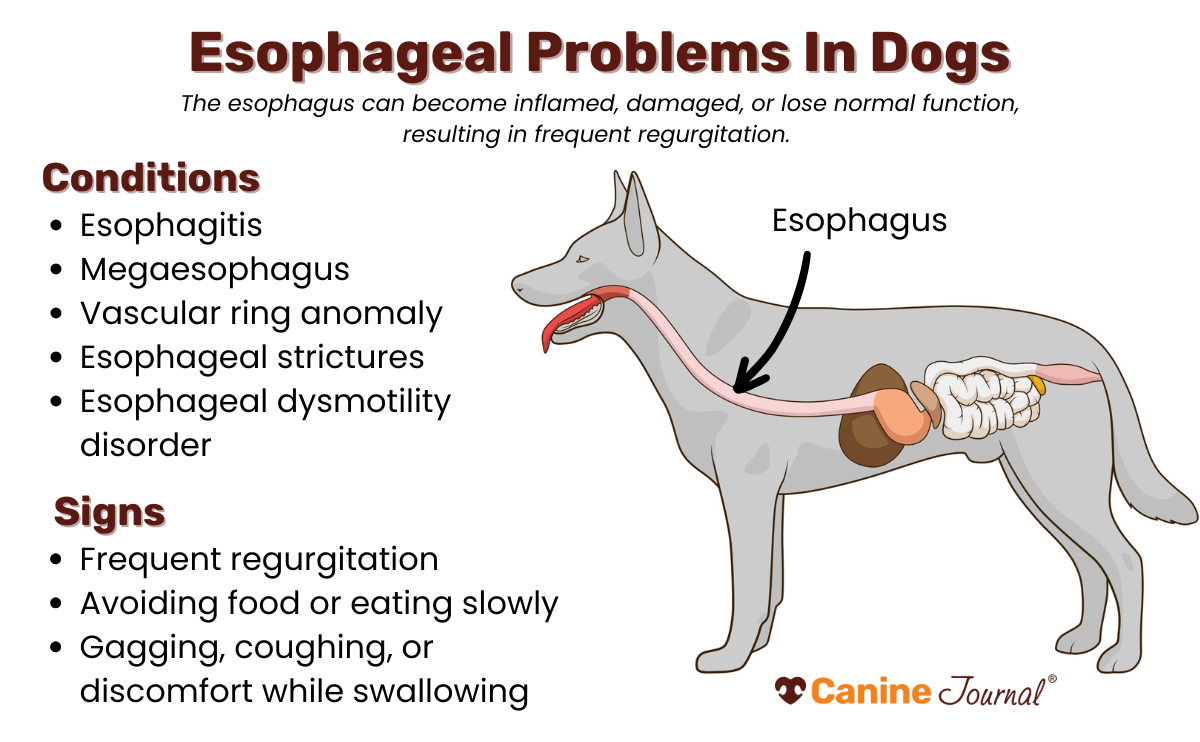
7. Other Hidden Health Problems
Regurgitation can sometimes point to broader health issues, especially if it becomes chronic or appears with other symptoms.
Possible causes include:
- Parasites or infections
- Neurological issues affecting muscle control, like myasthenia gravis
- Tumors or masses near the esophagus
- Addison’s disease (hormonal disease)
- Hypothyroidism (hormonal disease)
- Hiatal hernia (abdominal contents can move through an opening in the diaphragm and press on the esophagus)
My Experience With Regurgitation
My dog Tiny is a senior now, and with age has come a whole new set of eating quirks. One day, he turns his nose up at his bowl as if it were full of cardboard. The next day, he’s inhaling his kibble like he’s been lost in the desert for weeks.
Lately, he had started eating so fast you’d think he was training for a competitive eating contest. Unsurprisingly, he ends up puking it all back up, undigested and slightly grosser than when I put it in the bowl.
The solution? I’ve had to switch to serving him multiple tiny meals throughout the day. Less drama, less vomit, and (bonus!) he thinks he’s winning the treat lottery.
When It’s Really Vomiting: 7 Common Causes In Dogs
If what you’re seeing involves heaving, bile, or partially digested food, your dog is probably vomiting, not regurgitating. Occasional vomiting can be normal, but chronic or repeated vomiting is not.
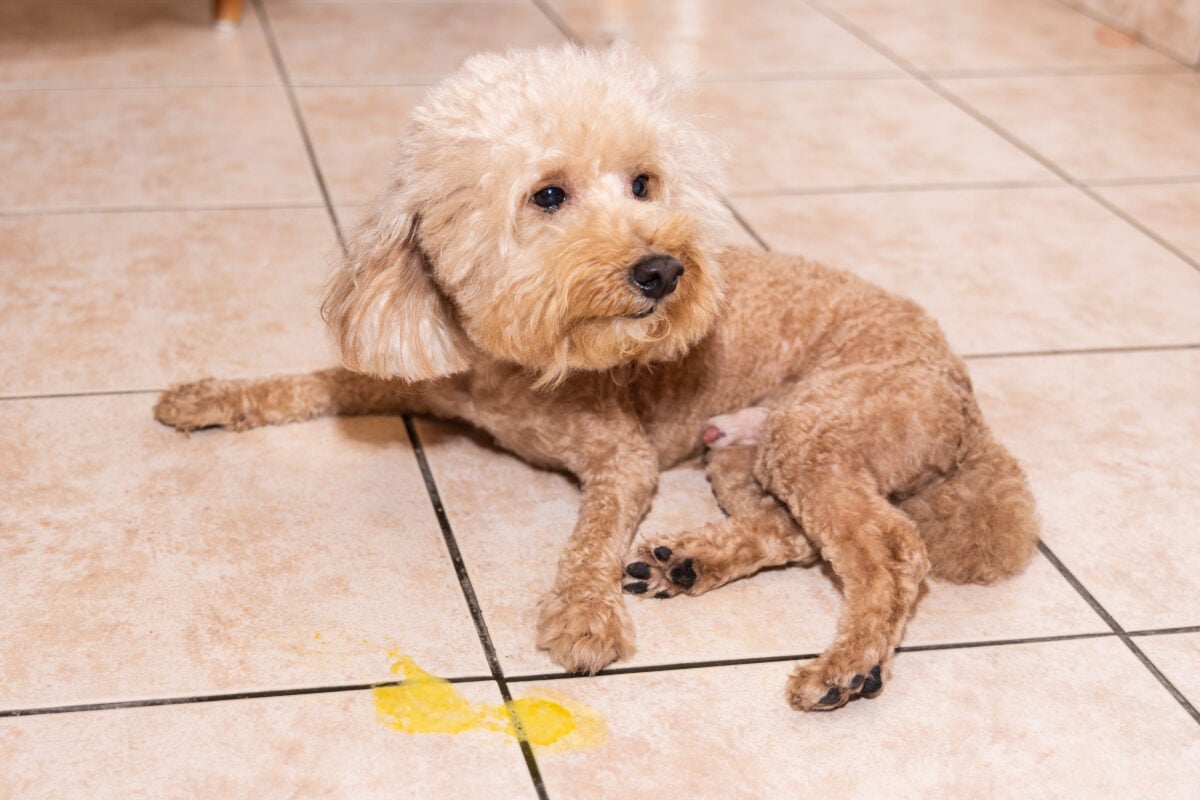
1. Food Switch Shock
Swapping dog food overnight? Our canine companions have delicate digestive systems, so that sudden change can turn your pup’s stomach upside down.
How to do it:
- Mix new food in slowly to avoid digestive upset
- Take 6–7 days to gradually transition your pup’s diet
See our guide on how to change your dog’s food safely.
2. Food Intolerance or Allergy
Your dog might be reacting to a specific ingredient. Common culprits include chicken, beef, dairy, or wheat. Signs of food sensitivity include itchy skin, chronic ear infections, vomiting, and loose stools or diarrhea.
At-Home Dog Allergy Tests
If you are unsure what’s triggering your pup’s allergies, you may want to consider an at-home allergy test. These tests may help identify food ingredients and environmental factors that may be a problem.
You can get results in a few weeks and share your report with your veterinarian to possibly narrow down your dog’s offending allergens and determine a treatment plan. However, these test kits aren’t meant to replace a vet’s diagnosis.

3. Your Dog’s Been Dumpster Diving
Trash, table scraps, or outdoor plants can cause stomach inflammation. Look for signs like yellow bile or blood in their vomit, lethargy, or loss of appetite.
4. Something’s Stuck: Intestinal Blockage
Chewed-up toys, bones, or even socks can get lodged in your dog’s stomach or intestines. Signs of an intestinal obstruction, like vomiting, no interest in food, abdominal pain, or straining or inability to poop. If you suspect your pup has an intestinal blockage, see your vet immediately.
5. Infectious Diseases
Several infectious diseases can cause vomiting in dogs. Among the most common are canine parvovirus, leptospirosis, and canine distemper. While not always contagious, gastroenteritis can also cause vomiting and is often associated with infectious agents.
6. The Parasite Problem
Roundworms, hookworms, tapeworms, Giardia, and coccidia are the most common parasites that invade a dog’s digestive system. These parasites can irritate the digestive system, leading to vomiting as a symptom.
7. Other Underlying Health Issues
Recurrent vomiting can signal several underlying health problems in dogs, including:
When To Contact Your Vet
According to Cornell University’s College of Veterinary Medicine, if your dog vomits or regurgitates more than once a week, it could be a sign of an underlying health issue. Frequent vomiting or regurgitation isn’t something to brush off.
It can disrupt your dog’s electrolyte balance, which is vital for normal cell function, and, if left untreated, may lead to dangerous dehydration. Your dog may need a full exam and diagnostic tests to rule out underlying health issues.
Call your vet if your dog:
- Vomits or regurgitates more than once a week
- Shows signs of pain or discomfort
- Loses weight or appetite
- Is vomiting blood, or the vomit contains matter similar to coffee grounds (digested blood)
- Vomits for more than 24 hours
- Seems tired, shaky, or dehydrated
Protect Your Wallet And Your Pup From Surprise Vet Bills
If your dog starts throwing up out of nowhere, it’s not just stressful — it can get expensive fast if your pup has a significant underlying health issue.
Pet insurance can help take the sting out of sudden vet costs by covering a large portion of your unexpected vet bills for diagnostics, medications, and treatments for underlying issues. Check out our in-depth comparison of the best pet insurance providers for dogs.
Frequently Asked Questions
Dogs vomit or regurgitate more often than we’d like, and it can leave you with a lot of questions. Here are answers to some of the most common concerns. If you don’t see yours here, drop your question in the comments. We’re happy to help.
Why Is My Puppy Vomiting Undigested Food?
Puppies have more sensitive digestive systems and smaller stomachs than adult dogs. This makes them more prone to regurgitation and vomiting, especially if they eat too fast or undergo sudden diet changes.
- Keep an eye on their behavior and appetite
- Frequent episodes should be checked out by your vet
Why Does My Dog Vomit Undigested Food Hours After Eating?
If it happens long after a meal, it’s probably vomiting, not regurgitation.
- This could point to a deeper digestive issue
- Monitor closely and consult your vet if it repeats
My Dog Throws Up But Seems Fine. Should I Be Worried?
A one-off vomit or regurgitation with no other symptoms? It’s likely not a big deal. But if it happens often, even if your dog seems okay, it’s worth getting checked out.
How Do I Know If My Dog Has Megaesophagus?
Regurgitation that begins in puppyhood and continues regularly might be a sign. A vet can diagnose it with x-rays and other tests.
Sometimes, Diet Can Make A Big Difference
Sure, some cases of regurgitation or vomiting aren’t directly related to your dog’s food. But sometimes, changing your pup’s dog food can help resolve some digestive problems.
A high-quality diet supports healthier digestion, strengthens the immune system, and helps prevent issues like regurgitation and vomiting in the future. You may want to consider fresh dog food or air-dried dog food, which contain easily digestible, whole-food ingredients.



